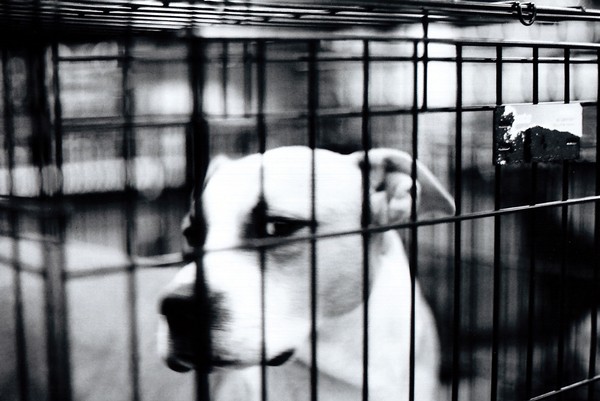The central argument is that the VA's position as a public agency involves some responsibility in disclosing how it conducts tax-funded experiments on dogs. Stokes is one of only three VA centers in the U.S. that runs these animal experiments. (The other two are in Milwaukee and Richmond, where surgical experiments involve hearts and brains and spines. The facility in Los Angeles recently stopped animal testing under pressure from U.S. Congressional reps.)
Because of the centers' obfuscation with public records requests, which is the tentpole allegation in this lawsuit, it's impossible now to know what is really happening to these dogs. Media reports and WCW statements (unconfirmed by Scene) have described brain, spine and heart surgeries on puppies that, often enough, are ultimately killed.
"Because the Cleveland VA has refused to provide us with the approved application for its invasive and deadly taxpayer-funded experiments on young hound dogs, public details on their current project is limited," Justin Goodman tells Scene. He's the vice president of advocacy and public policy for WCW.
He did, however, cite an October 2017 report authored by Stokes Cleveland VA experiments and other local medical researchers, in which "lung inflation" procedures are documented. The paper describes the process of anesthetizing 14 adults dogs, then "suturing" an endotracheal tube into their bodies. The experiment involved periodic inflation of the lungs with carbon dioxide, the result being distorted breath cycles that were studied as reflexes that "might be significant in understanding respiratory control mechanisms in newborn infants." (There is no mention of veterans in the paper.)
From the subject and methodology of the experiments to the public tax dollar underpinning, there's a spectrum of information that WCW has been seeking in its watchdog efforts. But where Los Angeles terminated its dog experiments and the other two facilities being more forthright in their records, the Stokes Cleveland Center remains a source of difficulty.
"Unlike Stokes," Goodman says, "other VA facilities using dogs have provided us with the project applications which show, for instance, that at the Richmond VA, five-month-old puppies have latex injected into their arteries to induce heart attacks and are then forced to run on treadmills to stress their damaged hearts, after which they’re killed and dissected."
In Cleveland, records of any surgical experiments are almost nonexistent.
"We first learned about the VA’s secretive and wasteful dog experimentation program by reviewing government contracts and databases," Goodman says, "and have since ascertained additional details via VA whistleblowers, Congress and Freedom of Information Act requests like the one we’re contesting in Cleveland."
With FOIA on one hand, WCW has turned to the public in getting out its message that this information is in the broader interest of American taxpayers. Billboards, paid for by the White Coat Waste Project, arrived in Cleveland this year to publicly announce that these experiments were taking place without a sense of real public transparency. Litigation is ongoing.
The lawsuit specifically attacks the VA's public records management and responsiveness. There are two public records requests that the WCW is tracking, though neither has resulted in full compliance yet. (The group is seeking established protocol measures that the VA follows when carrying out dog experiments.) One of those requests yielded "169 heavily redacted responsive pages" in August.
Those documents led to the revelation that the VA had run "invasive and deadly lung experiments" on 30 mixed-breed hounds purchased between 2016 and early 2017 with public tax dollars. Some of those puppies were later killed before they had turned 1. At least one was described as "friendly" just two weeks before being euthanized.
In a separate WCW lawsuit, also filed in federal court, the U.S. VA Department has filed a motion for summary judgment, asserting that it has followed FOIA compliance policy and taking a right-to-privacy argument in defending its redactions. (VA personnel have received death threats in light of this dog-testing information making it into major media outlets, like USA Today.)
Included in that defense is an outright denial of any records relating to where (and from whom) these puppies are being purchased and where these experiments are taking place. Details made available through USASpending.gov federal contract records point to dog breeders in New York, Indiana and Pennsylvania selling "hounds" and "canines" and "mongrels" to the federal government. Marshall Farms Group (NY), LBL Kennels (IN) and Covance Research Products (PA) sold multiple dogs to the Cleveland VA to the tune of $600 to $2,000 each. Marshall Farms and Covance are USDA-licensed "Class A" animals breeders; LBL is "Class B," which denotes different breeding and distribution protocol.
But outside of WCW's cross-referencing work, it's not like the VA has supplied those details to the public. In court, the VA defense remains adamant.
In response this legal action (and the billboards) earlier this year, the VA issued the following statement:
"Research studies to advance medical treatment for our veteran patients will sometimes involve the use of animals.
"After the scientific merit of the research study is established by independent scientific reviewers, Cleveland VA animal research is subject to a strict system of review and oversight to ensure compliance with ethical and regulatory standards for the care and use of the animal subjects. Like university and private animal research programs, Cleveland VA programs comply with the USDA (U.S. Department of Agriculture) Animal Welfare Act Regulations and the Public Health Service Policy."
Across the three testing facilities, the VA insists that these dog experiments are serving the benefit of paralyzed veterans, among other patient sectors. "The notion of legislating hope and scientific potential based on emotion, imagery, and layman sensibilities is presumptuous," Sherman Gillums, executive director of Paralyzed Veterans of America, told Cleveland.com this past summer. "The scientific community has already drawn those boundaries, and we simply need to enforce them, not kill all hope for the millions of human beings who stand to benefit from continued research."
Elsewhere, U.S. Secretary for Veterans Affairs David Shulkin, appointed by President Donald Trump, has defended the dog experiments:
"VA’s canine research program represents a great example of why the department exists, as one of our current canine research studies illustrates. The study focuses on ways to prevent serious and potentially fatal lung infections that affect some veterans with spinal cord injuries because they are unable to cough effectively.
"The commercial demand for this type of study is almost non-existent. The patient population affected by this condition is simply too small to motivate private companies to pursue such research on their own. That’s why VA and its canine research efforts — efforts that in many cases are not replicated in the private sector — are so important."
Animal testing is not a new or novel scientific course at either the federal level, nor at major public universities. But this case reveals how secretive the researching agencies can be. And with a brighter spotlight comes an increased sense of awareness among taxpayers and their political representatives.
There's a bill working its way through the U.S. House now — the PUPPERS Act of 2017 — that would specifically prohibit federal agencies like the VA from conducting the most "unkind and painful procedures and experiments" on dogs. The bill would put an end to the most intense tiers of USDA pain descriptions: categories "D" and "E," which include water deprivation, infliction of burns, terminal cardiac blood collection, post-operative distress, exposure to extreme environmental conditions and more. (The bill goes beyond just the VA experimentation that we're talking about here. As of now, the USDA permits the federal government writ large to carry out those sorts of procedures in a variety of settings. Class "E," to be clear, includes legal procedures that can cause death.)
The PUPPERS Act was introduced in July. It's presently in subcommittee; 53 representatives have signed on as co-sponsors from both major parties.
In July, the U.S. House unanimously approved an amendment to the Make America Secure Appropriations Act (the 2018 federal budget) that would defund these dog experiments at the VA. In practice, that amendment mirrors elements of the PUPPERS Act.
"As a combat-wounded veteran, its alarming that the VA is spending taxpayers’ money abusing dogs in unnecessary experiments when veterans are still unable to get the treatment and care they need," co-sponsor U.S. Rep. Brian Mast (R-FL) said in a statement provided to Scene. (Mast helped introduce both the budget amendment and the PUPPERS Act.) "I'm proud that the House of Representatives unanimously passed my legislation to defund these wasteful and cruel dog tests and am urging my colleagues in the Senate to do the same."
Locally, the Cleveland Animal Protective League is publicly supportive of WCW's campaign and the PUPPERS Act. "Our interest stems from the fact that in this day and age we really don't see the necessity of using dogs for this incredibly invasive and painful and distressful type of research," APL CEO Sharon Harvey tells Scene. "We're heading into 2018, and this is man's best friend. We do believe that medical research offers options now, and that there's no indication that these studies are truly producing information that is helping veterans. We believe veterans deserve the absolute best medical care and support from this country. We're not convinced that this experimentation using dogs is the way to deliver care to veterans."
And certain segments of the American veteran population certainly agree; this issue has been gaining serious public traction, and a recent op-ed from a disabled U.S. Air Force vet raises concerns over the secrecy around this sort of experimentation at the VA and urges a closer look from congressional representatives. "Despite my repeated requests to VA press secretary Curt Cashour," Benjamin Krause writes, "VA has yet to name a single veteran-focused medical advancement that has ever resulted from dog testing in nearly 100 years of VA research."
We'll be following these lawsuits and the public involvement as things move on. We've embedded the full WCW complaint, filed on Wednesday, below.
WCW v. U.S. Dept. of VA by sandyatscene on Scribd















